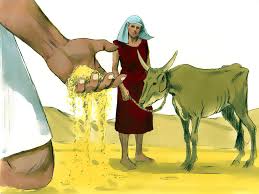The People of Egypt Brought Their Livestock to Joseph
and He Gave Them Food
47: 15-17
The people of Egypt brought their livestock to Joseph and he gave them food DIG: What was significant about the Egyptians giving up their livestock?
REFLECT: When have you had to give up something that you worshiped to survive? Something that you had to give up to live spiritually, not physically. Something that was not giving you life, but was killing you? Have you had to give up a relationship you knew was wrong? Drugs? Alcohol? Television? How is your life better now?

When the money of the people of Egypt and Canaan was gone, all Egypt came to Joseph and said: Give us food. Why should we die of hunger before your eyes? Our money is all spent buying grain. What would he do? Then Joseph said: Bring your livestock, since your money is gone (47:15-16).
So in the second stage (to see link click Kq – Joseph and the Famine), they brought their livestock to Yosef, and he gave them food in exchange for their horses, their sheep and goats, their cattle and donkeys (47:17a). It must have been terribly difficult for the people to give up their livestock for religious reasons. When a new king, who did not know about Joseph refused to let the Israelites go to worship the LORD, God told Moses that He would bring a terrible plague on the livestock in the field, on the horses and donkeys and camels and on the cattle and sheep and goats. But ADONAI made a distinction between the livestock of Isra’el and that of Egypt, so that no animal belonging to the Israelites would die (see my commentary on Exodus Bo – The LORD Will Bring a Terrible Plague on Your Livestock in the Field). Every plague of Egypt attacked something that they worshiped, and they worshiped their livestock.
Eventually all Egyptian livestock became Pharaoh’s possession. This kept the people going for another year, but ultimately all their animals were also gone. Both the money and the animals became the property of Pharaoh, or, in effect, were owned by the central government. This arrangement actually benefited both the people and the animals, since they would have been unable to keep the animals alive during the famine.731
And Joseph brought them through that year with food in exchange for all their livestock (47:17b). Here Yosef is pictured as a shepherd who was guiding his people through a dangerous and difficult period. Perhaps the phrase brought them through reflects the fact that Joseph’s actions were not harsh or greedy, but he had the people’s best interests in mind.732 Every time the people gave Yosef something of value, he gave them grain to live.



Leave A Comment